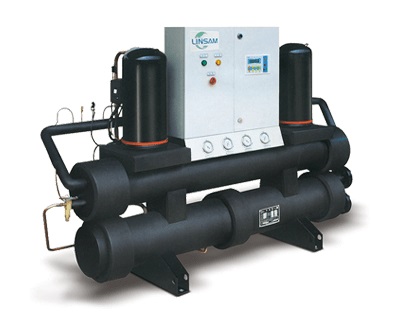Clausius stated the second law of thermodynamics as: heat cannot be transferred spontaneously from a low-temperature object to a high-temperature object. The heat pump system transfers energy from low-temperature objects to high-temperature objects, at the expense of part of the electrical energy, and obtains energy from the natural environment for heating or cooling. The energy provided by the heat pump is much greater than the energy consumed, and it is a measure to comprehensively utilize energy. The heat pump is composed of evaporator, condenser, compressor, expansion valve and other components. Heat pumps can be roughly divided into air source heat pumps, water source heat pumps (water loop heat pumps) and ground source heat pumps according to different heat sources required.

What is the difference between ground source heat pump and water source heat pump?
The water source heat pump is an air conditioning technology that uses the solar energy stored in the earth’s water as a cold and heat source for conversion. Water source heat pumps can be divided into ground source heat pumps and water loop heat pumps. Ground source heat pumps include groundwater heat pumps, surface water (river, river, lake, sea) heat pumps, and ground source heat pumps; water source heat pumps using tap water are traditionally called water loop heat pumps.
Ground source heat pump is a kind of high-efficiency energy-saving air-conditioning system that utilizes shallow geothermal resources (also called ground energy, including the amount of groundwater, soil and surface water carried). The system integrates geological prospecting technology, heat pump technology and HVAC technology, and uses geothermal resources for heating and cooling. The ground-source heat pump realizes energy transfer at low temperature or high temperature by inputting a small amount of high-grade energy (such as electric energy). Ground energy is used as a heat source for heat pump heating in winter and a cold source for air conditioning in summer. Generally, the coefficient of performance COP (referring to the ratio of its heating capacity to the electric energy consumed) of the ground source heat pump unit reaches 3.8-5.4, that is, the energy consumption of 1kW can get more than 4kW of heat or cooling capacity. The ground source heat pump has a much higher operating efficiency than traditional air conditioning systems, which can save energy and operating costs. In addition, the relatively constant temperature of the ground energy makes the operation of the heat pump unit more reliable and stable, and also ensures the efficiency and economy of the system. The ground source heat pump system can be used for heating, cooling, and domestic hot water. One machine has multiple uses, and the initial investment is relatively small. One system can replace the original boiler and air conditioner. It can be used in various buildings.
We produce wide range ground source heat pumps from 8KW to 350KW, view more about our linsam produced ground source heat pump and water source heat pumps, pls visit us website, thank you!
